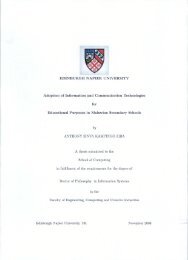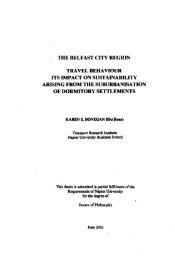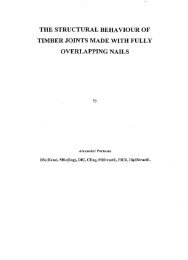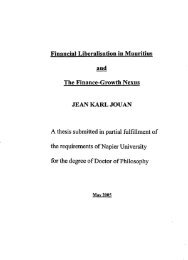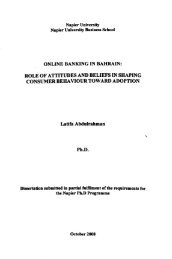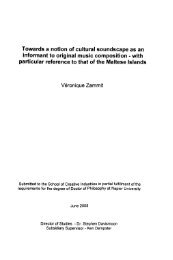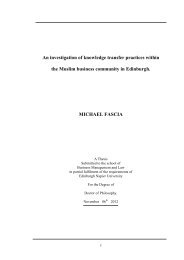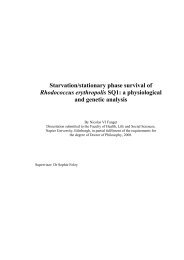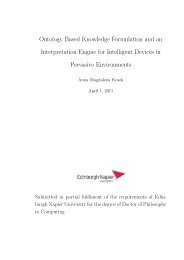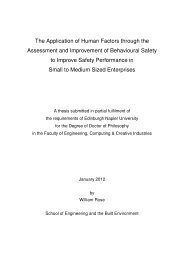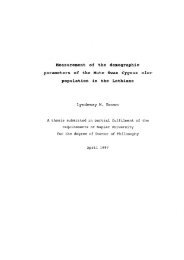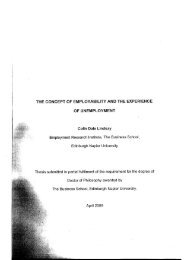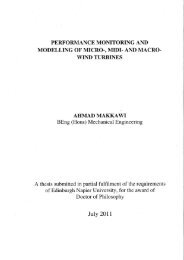The Role of Niche Tourism Products in Destination - Repository ...
The Role of Niche Tourism Products in Destination - Repository ...
The Role of Niche Tourism Products in Destination - Repository ...
Create successful ePaper yourself
Turn your PDF publications into a flip-book with our unique Google optimized e-Paper software.
<strong>of</strong> the enquiry to attempt to understand their perspectives and feel<strong>in</strong>gs. <strong>The</strong> knowledge base and outputs <strong>of</strong> tourism research<br />
should help to guide and <strong>in</strong>fluence the <strong>in</strong>dustry on which it is based.<br />
Tribe (2004) comments on how tourism research tends to fall with<strong>in</strong> two ma<strong>in</strong> fields. <strong>The</strong> first he identifies as ‘tourism bus<strong>in</strong>ess<br />
studies’ <strong>in</strong>clud<strong>in</strong>g market<strong>in</strong>g, management and tourism corporate strategy, the second ‘non-bus<strong>in</strong>ess tourism studies’ <strong>in</strong>clud<strong>in</strong>g<br />
areas such as tourism perceptions and social and environmental impacts, with the most consolidated area be<strong>in</strong>g the bus<strong>in</strong>ess<br />
aspects. <strong>The</strong>re has, however, only been limited application <strong>of</strong> critical tourism research with<strong>in</strong> a bus<strong>in</strong>ess or managerial context<br />
(Chambers, 2007a). However an emphasis on bus<strong>in</strong>ess research does not have to be focused on positivistic approaches to<br />
knowledge creation but must embrace other perspectives and methodologies. This has been apparent <strong>in</strong> my own research journey.<br />
Work<strong>in</strong>g as an early career researcher there was a concentration on us<strong>in</strong>g a quantitative approach. My ontological stance<br />
perceived the tourist world to be real and predictable, guided by external forces such as governmental policy and economics. This<br />
was reflected also <strong>in</strong> the epistemological basis <strong>of</strong> my research with quantitative research conducted under strict procedures with<br />
little <strong>in</strong>put or <strong>in</strong>fluence from the researcher. However, as I have matured, developed and ga<strong>in</strong>ed confidence as a researcher I have<br />
embraced us<strong>in</strong>g more mixed methodologies with a focus towards a more qualitative/<strong>in</strong>terpretative approach to research. Seek<strong>in</strong>g to<br />
understand from an <strong>in</strong>sider’s perspective that, from an ontological stance, there are multiple explanations or ‘realities ‘that <strong>in</strong>form<br />
my research.<br />
This work can also be seen with<strong>in</strong> the conceptual framework <strong>of</strong> Denz<strong>in</strong> and L<strong>in</strong>coln’s (1998) five ‘moments’ <strong>of</strong> qualitative research.<br />
<strong>The</strong>ir third moment is termed ‘blurred genres’ and this is highly relevant to the work presented here. It relates to how ‘theories,<br />
techniques and approaches could be borrowed, mixed and matched accord<strong>in</strong>g to the research task’ (Phillimore and Goodison,



